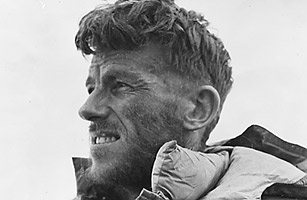
(6 of 7)
Was it harder than Everest?
Oh, no. It was very different in many ways. The problems of snow and ice were similar, but on a big mountain like Everest, there were more immediate dangers — the possibility of avalanche or falling off the mountain or going down a crevasse. In the Antarctic, the temperatures on the whole were colder, the distances were vast and it was a much longer sort of business, really. So in our trip to the South Pole, we were under constant tension, for long, long periods. For hours we'd be under great tension. Whereas on a big mountain it would be for short periods.
I enjoyed it. I had been keen to get to the South Pole.
And while you were doing the adventures, you became involved with Nepal, building the schools and so on.
I had built up a very close friendship with the Sherpa people, and it was obvious that they lacked so many of the things that we took for granted — there were no schools, and certainly no medical attention available. I liked the Sherpas and I admired them and I just thought, well, maybe there's something I can do. Once I've decided to do something, I do usually try to carry it through to fruition. So once the Sherpas said that the main thing they wanted was a school, I was determined that I would raise the funds. So we went ahead and built a school and hospital in 1966. We now have 30 schools and a couple of hospitals and a dozen medical clinics.
And you became a diplomat as well as a school builder.
I became the New Zealand ambassador to India — high commissioner, as we call it — and I was also high commissioner to Bangladesh and ambassador to Nepal.
We had four and a half years in Delhi from [1985 to '89] and we really enjoyed it. June and I on many occasions were invited along to quite important functions in which we would be the only foreigners, and we loved that. I like India, it's a really interesting place. I think it's doing very much better. When I first went to India in 1951, India was very different — much greater poverty, dead people in the streets. Now that's very rare.
But along the way there was tragedy. Tell us about Louise Rose.
I married Louise shortly after the Everest expedition. Louise was a good deal younger than I was, but she was a keen mountaineer. She was very much involved in the out-of-doors, and was lots of fun. We did a lot of family treks, we really enjoyed them. They weren't really extreme, they were more camping trips, but pretty energetic trekking. We were very keen that the kids should learn to enjoy the out-of-doors, enjoy swimming and camping and walking around the hills and all the rest of it. But I never at any stage really tried to persuade them — even Peter — to become a mountaineer.
And then Louise and your daughter Belinda were killed in Nepal in 1975. It must have been awfully hard to recover from that.
Well, of course it was tremendously difficult. It changed everything. My life disappeared, and I did drift for a time. I didn't really believe that time would heal the loss. But after five or six years, I found I was getting interested in some new things. Time did heal things. But things have always remained different.
What did you think of Peter's continuing to climb?
That was entirely up to him. He decided he wanted to do it and he went off. I've never climbed with Peter on a big mountain. He did more and more of it and became surer, a much better technical climber than ever I was. He was always trying difficult routes, wasn't interested in climbing easy routes. He had quite a few accidents. He nearly killed himself once, and I think four members of his parties died on the mountains. So I felt relieved when he finally did climb Everest. It was up the same route we had used. He telephoned me from the summit of the mountain, quite an unusual experience.
What did you talk about?
Oh, we talked about all sorts of things. We had a very good discussion. One thing that rather pleased me was: He complimented me on the Hillary Step. He said it was more demanding than he expected it to be.
What about all the climbing traffic on Everest these days?
Well, I've been sort of fairly outspoken on this. I think, A, that too many people have been permitted to go on the mountain at one time and, B, that there's too much rubbish being left on the mountain. The commercialized trips and the overcrowding were what caused the tragedy [in 1996, when eight died on Everest after summiting late and getting caught in an afternoon storm — the incident chronicled in Jon Krakauer's Into Thin Air, among other books]. It was inevitable. I've been forecasting a disaster of that nature for some time. And it will happen again. You see, with so many climbers on the mountain, climbers are practically queuing up for the difficult parts. What happens then, quite a few don't get to the top till three or later in the afternoon. And then, like in this instance, the late weather comes sweeping in.